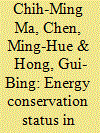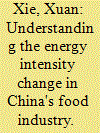| Srl | Item |
| 1 |
ID:
069811


|
|
|
| 2 |
ID:
116730


|
|
|
|
|
| Publication |
2012.
|
| Summary/Abstract |
The food industry in Taiwan is labor intensive, the cost of raw materials is high, and there is much product diversification. Although this industry is primarily small and medium scale, it is a large user of electricity in Taiwan's manufacturing sector. The concentration of greenhouse gases (GHGs) from manufacturing activities and vehicle emissions has increased remarkably. Energy audits are a basic and direct means by which energy efficiency can be improved, energy consumption reduced, and carbon dioxide emissions inhibited. This work summarizes the energy saving potential of 76 firms and the energy savings implemented by 23 firms as determined by energy audit tracking and from the on-line energy declaration system in Taiwan's food industry. The results of this study can serve as a benchmark for developing a quantified list in terms of potential energy savings and opportunities for improving the efficiency of the food industry.
|
|
|
|
|
|
|
|
|
|
|
|
|
|
|
|
| 3 |
ID:
166456


|
|
|
|
|
| Summary/Abstract |
Although China's food industry is not energy-intensive, its rapid development has brought enormous challenges to the realization of the energy-saving goal due to its huge scale. So the industry must reduce its energy intensity as much as possible. This paper uses a comprehensive decomposition analysis to study the energy intensity changes in China's food industry between 2000 and 2013, and draws the following conclusions: (1) technological progress have the most significant impact on reducing energy intensity, reducing it by 70.2%; (2) technical efficiency change hinders the energy intensity decline, which in turn increases it by 18.4%; (3) the substitution of capital for energy is conducive to the decline of energy intensity; (4) the government's industrial policy has played a role in energy conservation, but there is room for improvement. Therefore, this paper suggests that: Firstly, the R&D investment in production and management technology should continue to increase, and more importance should be attached to technology diffusion and transfer between regions. Secondly, more effective incentives and stricter constraints should be implemented for the food industry. Thirdly, the planning of the industry layout should be adapted to regional advantages, and targeted policies should be carried out in different regions.
|
|
|
|
|
|
|
|
|
|
|
|
|
|
|
|